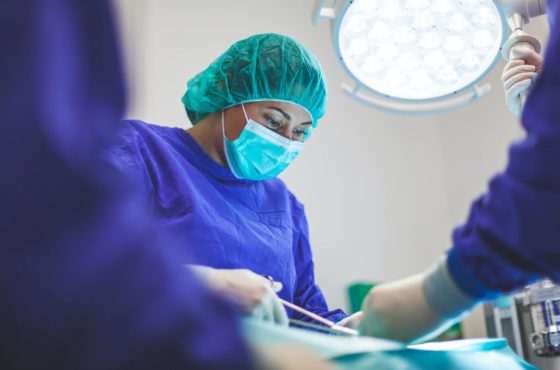Hernia mesh repair is one of the most common surgeries in the United States.
In fact, every year, more than a hundred thousand hernia mesh devices are implanted in the country alone.
Unfortunately, the hernia mesh, which is popularly used by doctors for hernia repair surgeries, is linked to a wide array of complications.
These complications may arise immediately or soon after surgical mesh implant. However, pain from hernia surgery and hernia mesh complications may also occur years after your procedure.
To be more precise, according to a 2016 study, “nearly a third of patients experienced complications or needed additional surgery more than five years after the surgical mesh was implanted.”
The good news?
An increasing number of people are now fighting for their rights by filing hernia mesh lawsuits. They, too, have experienced pain and serious complications following hernia repair surgery.
The truth?
You are not alone in this legal battle. Whether you experienced symptoms immediately after your surgery, or you’re an unsuspecting patient who suffered from hernia mesh problems years later, you might be eligible for compensation. Filing a hernia mesh lawsuit today will be a stepping stone to achieve that goal.
Read on to learn more about the potential risks of a hernia mesh surgery and how you can seek help.
Hernia Repair
Hernias occur when there is a weak spot in the wall of a muscle or a tissue. This causes an internal organ or other body parts to protrude or squeeze through.
Inguinal hernia is the most common type of hernia. An inguinal hernia occurs in the abdomen near the groin area. It develops when fatty or intestinal tissues push through the inguinal canal, a passage in the lower layers of the abdominal wall.
“Sometimes a hernia can be visible as an external bulge particularly when straining or bearing down,” the U.S. Food and Drug Administration states.
In order to fix a hernia, a patient needs to undergo a procedure called hernia repair surgery.
Hernia Mesh Surgery
According to a 2017 study, hernia mesh surgery is one of the most common procedures done worldwide.
Each year, over 20 million hernia repair surgeries are done globally.
According to the researchers, the United States adopt the widespread use of hernia mesh in surgeries like hernia repair. In fact, more than 80% of hernia repairs performed in the country make use of mesh products.
Hernia repairs involve pushing the bulge back into the body part that should contain it. The surgical mesh is often healthcare professionals’ go-to device in fixing a hernia.
What is a Surgical Mesh?
According to the FDA, “the majority of surgical mesh devices currently available for use are constructed from synthetic materials or animal tissue.”
Synthetic mesh can either be absorbable, non-absorbable or a combination of both absorbable and non-absorbable materials.
The non-absorbable type of synthetic surgical mesh has a protective substance covering. This type of mesh remains in the body indefinitely and is a permanent implant. Both types of synthetic hernia mesh have been known to cause hernia mesh problems years later in some patients.
On the other hand, all surgical mesh derived from animal tissue is absorbable. The tissue is disinfected and processed before it is used for hernia repair surgery.
How Many Years Does Hernia Mesh Last?
Hernia mesh implants which are of the synthetic, non-absorbable type are supposed to be permanent, says the FDA.
“Non-absorbable mesh will remain in the body and is considered a permanent implant,” the agency states.
On the other hand, absorbable mesh products cannot provide long-term repair to hernias.
However, the synthetic types of hernia mesh are both notorious for causing hernia mesh problems years later. Plaintiffs who developed hernia mesh complications following surgery or even years after the procedure have started filing hernia mesh lawsuits.
If you or your loved one suffered from complications due to a hernia mesh surgery, you can also take part in the legal battle.
However, before filing your own hernia mesh lawsuit, it is important to confirm your symptoms first by looking at the tell-tale signs that your hernia mesh has failed.
What are the Symptoms of Hernia Mesh Failure?
You can tell if your hernia mesh has failed once you begin experiencing symptoms linked to hernia mesh complications.
Some of the most common hernia mesh complications have the same symptoms, while other symptoms are unique to a certain complication.
Below is a list of symptoms that patients may experience once their hernia mesh has failed:
- severe pain
- high fever
- bruising and swelling
- difficulty urinating and passing gas and stool
- nausea and vomiting
- redness or inflammation around the surgical site
Needless to say, patients should contact their doctor once they experience these symptoms, as hernia mesh complications can be difficult to diagnose alone. You should tell your doctor that you are suffering from these symptoms and that you have a hernia mesh implant.
Hernia Mesh Complications
Hernia mesh complications include severe pain and discomfort, mesh adhesion, bowel obstruction or perforation, hernia recurrence, mesh infection, mesh migration, and rejection.
After hernia surgery, patients have complained about symptoms including pain, as well as their hernias coming back, also called hernia recurrence. Patients can suffer from hernia mesh complications immediately after hernia surgery, while some patients may experience hernia mesh problems years later.
And you might not want to hear this, but…
The most serious complications following hernia mesh surgery are also some of the most common ones that patients may experience.
According to the FDA, the most common hernia mesh complications include:
- bowel perforation
- bowel obstruction
- adhesion
- mesh infection
- rejection
- mesh migration
- chronic pain and discomfort
- hernia recurrence
Among these hernia mesh complications, chronic pain is the one complication that patients most often complain about. According to a study, nearly one-third of patients who undergo hernia repairs experience this complication.
Chronic Pain and Discomfort
After a hernia mesh surgery, patients have complained about experiencing severe pain and discomfort, which is also the most common hernia mesh complication.
Depending on the site of hernia surgery, you may feel pain near the groin, abdomen, leg, and testicle.
In some patients, pain may be the only sign of the existence of a hernia mesh complication.
However, this could also turn into chronic, long-term pain which can last from three to six months, and even up to several years.
Mesh Adhesion
The FDA describes adhesions as “scar tissue that sticks tissues together.”
Usually, patients can only tell that they are experiencing mesh adhesion through symptoms like chronic and usually excessive pain.
Patients should be wary because mesh adhesion could lead to a life-threatening bowel obstruction.
Bowel Obstruction
Hernia repair surgeries that make use of the medical device hernia mesh can also cause bowel obstruction.
Bowel obstruction is a potentially life-threatening medical condition that calls for immediate treatment. In more severe cases, doctors recommend the removal of the bowel.
Mesh Infection
One of the most common hernia mesh complications is mesh infection.
Some patients might have a minor infection around the site of hernia surgery. In this case, antibiotics might just do the trick. In some cases, however, patients can suffer from a deep, chronic infection that is more severe and may cause redness and warmth around the area of hernia surgery.
Mesh Migration
In some cases, the surgical mesh moves or detaches after surgery. When this happens, the surgical mesh can potentially migrate through the abdomen.
Mesh migration can also lead to other hernia mesh complications like adhesions, fistulas, bowel obstruction, bowel perforation, and chronic and usually excessive pain.
Hernia Recurrence
You might think it’s not possible after hernia surgery. Sadly, it is.
Hernias can come back. This complication is called hernia recurrence. According to one study, you are less likely to experience hernia recurrence with mesh for hernia surgery, but it can still happen.
Other hernia mesh complications including adhesion, mesh migration, and bowel perforation, can potentially result in hernia recurrence.
Has there been a hernia mesh recall?
The very first hernia mesh recall was issued in 2005 by Davol Inc., a subsidiary of C.R. Bard. The expansion of this recall happened in 2006, and again in 2007.
In 2014, the FDA announced recalls of several hernia mesh products and started to issue a warning to the public about the medical device. The reasons stated by the agency behind the recalls ranged from poor performance to reports of adverse events to packaging errors.
One of the companies targeted by the FDA was C.R. Bard, for the potential risks of the defective mesh ring breaking apart, resulting in bowel perforation, among other hernia mesh complications.
Another company called out by the agency was Ethicon Inc., for the potential hazard of the hernia mesh losing its laminate coating. And lastly, Atrium Medical Corporation for packaging errors.
Can I Get Rid of the Pain through Hernia Mesh Removal?
Several patients who suffer from hernia mesh problems years later opt to have the mesh removed from their bodies.
However, hernia mesh removal can be more difficult and tricky than most patients realize.
This is because the mesh may have already shrunk, moved, adhered to other organs, or may already be broken. As a result, it may be hard or sometimes totally impossible to remove the device from the body.
Even in cases where mesh removal is an option, it may still take patients a couple of surgeries to have all pieces of the hernia mesh removed. Add to that the fact that mesh removal may still leave a patient with chronic and excessive pain because of nerve damage.
Some reports from patients even say that the side effects of having a damaged hernia mesh may leave people with a permanent disability or injury.
Other long-term physical side effects of a degraded hernia mesh include chronic groin or pelvic pain, pain during intercourse, urinary incontinence, and even depression and anxiety.
My Hernia Mesh Failed. What Should I Do?
If you think you are having symptoms related to hernia mesh complications because of a defective medical device, you may be eligible to seek compensation from the manufacturers of these medical devices, such as Ethicon Inc. and C.R. Bard.
Filing a hernia mesh lawsuit does not have to be a tedious process.
As we are aware of what suffering from the complications of hernia mesh may have already caused you, we are here to help.
Get in touch with us today and we will help you with the necessary legal steps you should take in order to make the manufacturers of these potentially defective medical devices accountable.
The clock is ticking.
Fight for your rights and seek justice against those who harmed you or a loved one today.






